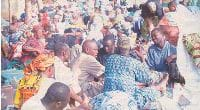Expand National Hajj Council Website
Representatives of Muslim groups attending the second National Hajj Conference in Accra have recommended the expansion of the stakeholders of the National Hajj Council (NHC) to ensure transparency, accountability and due process in the management of Hajj in the country. They proposed that the mandate of the NHC should be handed to it only at the annual National Hajj Conference, three months after every Hajj exercise. Consequently, the conference adopted a working document on Hajj management and operational guidelines to which the NHC shall be held accountable. The two-day conference, which ended yesterday, was organised by the three stakeholder organisations constituting the NHC, namely, the Ahlussunna Wal Jama'a (ASWAJ), the Coalition of Muslim Organisations, Ghana (COMOG) and the Federation of Muslim Women Association of Ghana (FOMWAG). It was held on the theme: "Hajj: A Challenge to the Leadership - Probity and Accountability in the Muslim Community". The delegates were drawn from the 10 regions and they represented sects, institutions, non-governmental organisations and a broad section of the Muslim community. The communiqué adopted at the conference urged the government to investigate the 2006/7 and 2007/8 Hajj exercises "in order to sanitise future operations, extending same to accumulated debts in ADB accounts attributed to past Hajj operations and bringing to book any culprits found to have been responsible for any malfeasance". It said failure by the government to live by its promise to carry out those investigations would not serve the interest of the Muslim community. The communiqué asked the government to maintain its policy of not involving itself directly in Hajj management and stick to its decision to hand over the management of the Hajj to the Muslim community through the NHC. It stressed that the NHC, as established in September 2005, had been ratified by the Muslim community represent• ed at the second National Hajj Conference. The communiqué noted that the organisation of Hajj, one of the five pillars of Islam, had been mismanaged in the country for years, hence the need to streamline its operations. Last year's Hajj saw prospective pilgrims sleeping at the Aviation Social Centre for about 10 days before their departure to the Kingdom of Saudi Arabia as a result of the late arrival of flights. Earlier, the Ambassador of the Islamic Republic of Iran to Ghana, Mr Valiollah Mohammadi, had challenged Muslim leaders and organisations to collaborate to find a lasting solution to the problems of Hajj in the country. He suggested the inclusion of people with experience and expertise on the body to manage the Hajj. The President of COMOG, Major Mohammed Easah (Retd), said the conference was held after due consultation with the National Chief Imam, Sheikh Usman Nuhu Sharubutu, and that it was to bring together representatives of the Muslim community to discuss, formulate and adopt proposals for the restructuring of the NHC as recommended by the committee of inquiry set up after the 2006/7 Hajj. Besides, he said, the conference was to study and adopt a draft working document on Hajj operations "to make the annual holy exercise hassle-free, reasonably comfortable for pilgrims and devoid of all the chaos, confusion, frustration and hardships"
Source: MJFM







